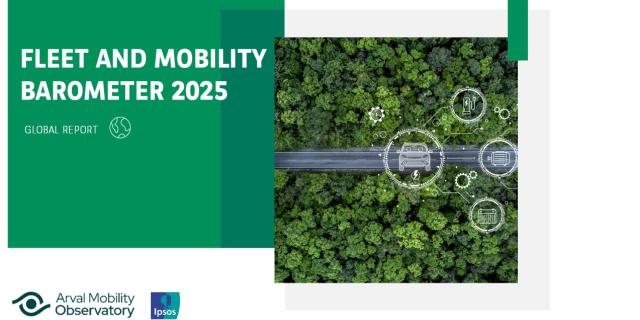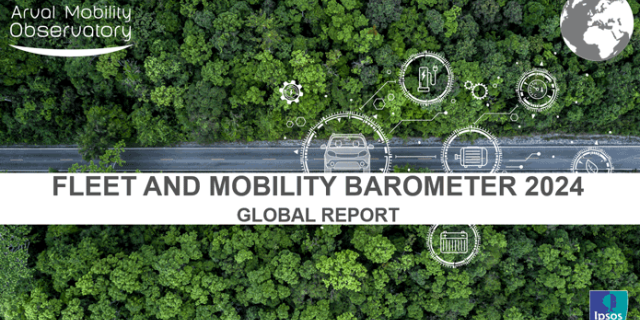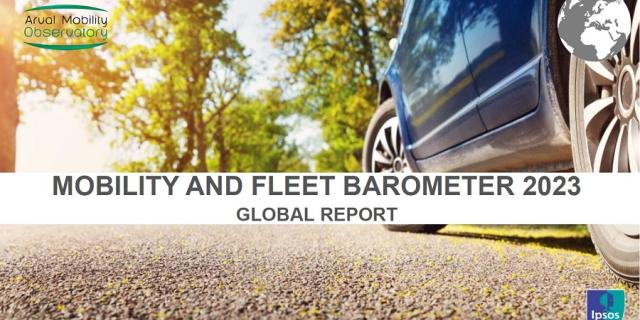Arval Mobility Observatory is pleased to share with you an overview of financial incentives available for employee mobility budget across several countries. It demonstrates that numerous countries, regions and local authorities in Europe have already put in place programs to promote sustainable mobility alternatives for employees on their way to work.
As of 2025, mobility practices continue to diversify, reflecting national priorities and regulatory frameworks. Understanding these differences is key to building coherent, responsible, and employee-centric mobility strategies across markets.
You can check each country by selecting it on the list below.
The information presented in this synthesis has been collected in July 2025, and published in September 2025.
-
France
France
In 2025, French companies have several options for their employee mobility budget.
1. Sustainable Mobility Package (Forfait Mobilités Durables)
This optional incentive encourages the use of low carbon modes of transport (e.g., cycling, carpooling, public transport, shared mobility):
• Eligibility: All employees, except those with a company vehicle
• Allowance: Up to €600/year per employee, or €900 if combined with a public transport subscription.
• Tax Advantage: Exempt from income tax and social security contributions
• Implementation: Optional, but increasingly discussed in Mandatory Annual Negotiations (NAO)
• Eligible commuting methods: Personal or shared bicycles, scooters, electric scooters, carpooling, car-sharing, and public transport
2. Public Transport Subscription Reimbursement
This is a mandatory benefit in France: all employers must reimburse their employees at least 50% of public transport subscription for employee commuting (including public bike rentals)
• Documentation: Employees must provide proof of subscription
• Tax Exemption: Reimbursement is exempt from tax and social security contributions up to 75%.
3. Transport Bonus (Prime Transport)
This optional benefit supports the use of personal vehicles in areas where alternative transport is limited, especially in rural or remote zones:
• For the transport bonus, the company benefits from an exemption from social security contributions:
• For fuel: up to €300 per year and per employee
• For costs related to the supply of electricity, plug-in hybrid or hydrogen vehicles: up to €600 per year and per employee.
In the case of a combination of the transport bonus and the sustainable mobility package, the tax exemption is capped at €600 per year and per employee
-
Belgium
Belgium
In Belgium, companies can offer their employees access to the Federal Mobility Budget (FMB), a tax friendly and budget-neutral mobility scheme. It allows employees who have already or are currently entitled to a company car to exchange their company car under certain conditions for a flexible, tax-friendly mobility budget or to choose a smaller car and use the remaining budget as part of the Federal Mobility Budget.
1. Federal Mobility Budget (FMB)
Calculated with the TCO of the current vehicle or a reference car per category, this system enables employees to voluntarily trade in their company car for a mobility budget that can be used in three well-defined and legally regulated pillars:
Pillar 1– Environmentally Friendly Company Car
Employees may allocate part of their mobility budget to financing a BEV company car. The vehicle must have low C02 emissions (capped at 95g/m) and comply with applicable European norms. The tax treatment for the company car financed through the mobility budget remains identical to that of a traditional company car, including the calculation of benefit in kind (BIK). the normal company car taxation is applied.
Pillar 2 – Sustainable Mobility
Employees can use their allocated budget for a range of sustainable mobility expenses without triggering any taxable benefit in kind (BIK), provided eligibility conditions are met. While these expenses may still include VAT, they are not considered taxable for the employee.
Eligible expenses include:
- Public transport: subscriptions and single tickets (e.g., train, metro, bus)
- Bike purchases or leasing (including e-bikes)
- Shared mobility: e-scooters, shared bikes, shared cars
- Soft mobility-related services: maintenance, accessories (helmets, locks)
- Occasional mobility: rental cars, taxis, ride-hailing services like Uber
- Housing costs: mortgage interest or rent payments, provided that:
- the employee lives within 10 km from the workplace, or
- She works more than 50% of the time from home
Employer advantages:
- All costs covered under Pillar 2 are 100% tax-deductible.
- No social security contributions or payroll taxes are due on the amount allocated to the employee.
Pillar 3 – Cash Payout
Any remaining budget not used in Pillars 1 or 2 will be paid out to the employee by cash. This cash payout is entirely exempt from income tax, but subject to a special annual social security contribution of 38.07% paid by the employee.
Eligibility criteria :
- For companies: Must have at least one company car available to employees for an uninterrupted period of 36 months. Startups younger than 36 months can also apply if at least one company car is in use.
- For employees: Must be eligible for a company car. New hires or employees receiving a car as part of a promotion can be eligible under the updated FMB framework.
Budget Calculation :
- The mobility budget is based on the Total Cost of Ownership (TCO) of the company car (leasing, insurance, maintenance, fuel, etc.).
Limits per calendar year :
- Minimum: 3,164 €,
- Maximum: Up to 20% of the employee’s total gros salary but capped at 16.875 €
The amount cannot exceed 20% of the gross annual salary.
Other considerations:
The Federal Mobility Budget must respect the principle of budget neutrality, meaning it cannot cost the employer more than the total cost of the company car it replaces.
-
Spain
Spain
In 2025, Spanish companies are still waiting for a law on sustainable mobility that can motivate companies to implement a mobility budget.
After almost 5 years, Spain's Sustainable Mobility Law remains unapproved.
Despite plans to finalize the law in 2024, it might now be approved in the second half of 2025 depending on the speed of internal proceedings. The goal is that companies with more than 500 employees or 250 employees per shift must develop a sustainable mobility plan.
- Sustainable Urban Mobility Plans (SUMPs)
Cities must adopt integrated strategies to plan sustainable transport networks.
- Low Emission Zones (LEZs)
Cities over 50,000 inhabitants must restrict high-pollution vehicles to reduce urban emissions.
- Subsidies & Incentives
Financial support for electric vehicles, charging infrastructure, and green mobility initiatives.
- Public Transport Investment
Boost funding and modernization of public transit systems to increase usage and accessibility.
- Promotion of Active Mobility
Expansion of cycling paths, pedestrian areas, and infrastructure for walking and biking.
- Green Taxation Measures
Eco-taxation policies to penalize polluting modes and reward sustainable alternatives.
- Digital & Technological Innovation
Support for smart mobility apps, data systems, and real-time transport management platforms.
-
Netherlands
Netherlands
In the Netherlands, employees need to first define and determine their use of the car. Whether it is a private one, used most of the time for private matters, or a business/company car that they use mostly for professional purposes.
Covering the staff travel expenses is therefore not mandatory if they use their own vehicle. It needs to be stated in their employment contract or in the collective labor agreement (CAO) of the industry the company belongs to.
In 2025, the Dutch government allows companies to reimburse their employees €0.23 per kilometer tax-free for commuting and business travel.
This amount is not considered salary by the Dutch Tax Administration, so no payroll taxes need to be withheld on it.
Employers may choose to reimburse a higher amount per kilometer, but anything above €0.23 treated as taxable income. There is no minimum travel allowance — the company decides how many kilometers they want to reimburse.- Mandatory Co2 reporting
Since July 1st, 2024, it is mandatory for all companies with more than 100 FTE to report CO2 emissions of all their employees. Companies need to register travel emissions as well as commuting emissions.
- Mobility Budget
The mobility budget put in place by the Dutch government is a monthly gross allowance. Dutch taxation allows companies to apply a net fiscal exchange against 23 cents/km (2024) for business and commuting travels. This leads to a net profit for the employee (with no increase in costs for the company). The employer receives a monthly payroll file for the gross + net allowances per employee.
- Own contribution lease car
When an employee exceeds a car lease budget (e.g. because of adding a holiday car to the contract), it leads to a net contribution by himself. However, companies can be supported by mobility actors in their policy. This also leads to a net profit for the employee (and possible cost savings for the company).
-
Germany
Germany
In Germany, the mobility budget is considered as a company allowance that provides employees with flexible access to various means of transport. However, tax treatment depends on the implementation model, the mode of transport used, and whether it is offered in cash, in kind, or reimbursement.
- Public transport
Fully tax free when used for commuting. This includes monthly subscriptions, single tickets, and national offers like the Deutschland ticket.
- Company Bikes
May be tax-free or benefit from reduced taxation when offered through leasing schemes. If the bike is made available for private and professional use, taxation rules depend on the usage and lease structure.
- Ride hailing, Taxis, Car sharing
These are not tax-free by default. However, if provided as a benefit-in-kind, they can fall under the €50/month tax-free threshold, provided the total of all non-cash benefits does not exceed €50. The amounts above are taxed at a flat rate of 30%, paid by the employer.
Main Mobility Budget Implementation Models
- Lump Sum (Salary Increase)
- Simple to introduce, but the full amount is subject to income tax and social security contributions, unless clearly identified as a separate benefit.
• No specific tax advantages, which often makes it less attractive for both employer and employee.
• Complex to track, as usage must be monitored per employee, per month.
• May be hard to promote due to limited tax understanding and HR system integration.
- Benefit-in-Kind (Voucher or Mobility card)
- Mobility budget provided in addition to salary (not as a replacement), either via a prepaid mobility card or vouchers.
- Tax-free up to €50/month, but this limit is shared with all other non-cash benefits (e.g., meal subsidies, fitness passes). If exceeded, a 30% flat-rate tax applies (Section 37b EStG), paid by the employer.
- Easy to manage administratively, especially when using mobility platforms.
- Cap: In some company practices, the benefit is limited to €10,000/year, although this is not a legal ceiling but a common threshold.
- Reimbursement Model
- Offers the highest tax optimization potential, especially when paired with digital tools that collect and verify transaction-level data.
- Minimizes the need for employees to submit receipts manually.
- Depending on usage and structure, some reimbursements can remain tax-free, particularly for commuting and public transport.
Challenges for Companies:
- Currently, no standardized fiscal treatment —the form (cash vs. in-kind) and usage purpose heavily influence the tax impact.
Ongoing Developments:
- A new draft of the law suggests amending §40 EStG to allow a 25% flat-rate tax on mobility budgets up to €2,400 per year.
-
Italy
Italy
In 2025, Italian companies cannot benefit from any mobility budget or fiscal advantages for their mobility budget.
However, a new regulation was introduced in Italy in May 2022. The goal was to provide Mobility Managers with tools to promote sustainable and alternative transportation options, while also enabling employees to benefit from economic incentives for individual mobility. This strategic plan aims to reduce reliance on individual private vehicles, thereby decreasing traffic congestion, lowering emissions, and encouraging the use of alternative, eco-friendly transportation modes.
-
Poland
Poland
Currently, there are no specific tax incentives in Polish law related to Mobility Pass or similar mobility benefits. If an employer funds commuting costs (public transport, bike, sharing, etc.) for an employee, it’s typically treated as employee income – and thus subject to PIT (Personal Income Tax) and social security contributions (ZUS)
Polish tax law provides exemptions only in cases of business-related travel.
-
Brazil
Brazil
Brazilian companies cannot benefit from any mobility budget or fiscal advantages for their mobility budget. However, a program and initiatives have been put in place by the previous government.
• MOVER Program: The Brazilian government introduced the 'MOVER' (Green Mobility and Innovation) program to promote sustainable mobility and automotive innovation. It includes Research & Development incentives and sets conditions for marketing new vehicles.
• Public transport investments: The French Development Agency provided a loan to support Rio de Janeiro's urban mobility policy, aiming to expand and enhance public transport services.
Sources
France
- FAQ : le forfait mobilités durables (FMD) | Ministères Aménagement du territoire Transition écologique
- Les dispositifs trajets domicile-travail pour alléger vos salariés
- Sustainable Mobility Package (FMD) | Entreprendre.Service-Public.fr
- Le Crédit Mobilité, on vous explique tout ! - Betterway
- Crédit mobilité : Fonctionnement, Mise en Place et Éligibilité
- Remboursement des frais de transport domicile-travail d'un salarié du secteur privé | Service-Public.fr
Belgium
- Mobility Budget - Everything you need to know
- Un budget mobilité pour tous, ça veut dire quoi ? L’expert Thierry Devresse nous l’explique – FLEET
Italy
- 05-MaaS-Corporate-Mobility-White-Paper.pdf Page 7, 8 & 9.
Germany
Spain
Netherlands
- Company use of a private car in the Netherlands | Business.gov.nl
- Paying your employees travel allowance | Business.gov.nl
Brazil
Legal Disclaimer
Whilst every care has been taken to ensure the accuracy of this synthesis of changes to statutory taxation and the associated mechanisms evolutions in Europe (the “Synthesis”), , Arval Service Lease, through its Arval Mobility Observatory ( “ARVAL AMO”) does not give any representation or warranty as to the legal, regulatory, tax or accounting implications of the matters referred to in this Synthesis nor for the accuracy of the information provided herein. This Synthesis is provided for information only. Thus, this Synthesis cannot be assimilated as a tax advice /recommendation issued by Arval AMO. Therefore, any recipient of this Synthesis should take independent advice where necessary. In this respect, ARVAL AMO is not responsible or liable for any liability, loss, claim, cost, or expense that could be incurred by any recipient as a result of relying on any information contained in this Synthesis.














